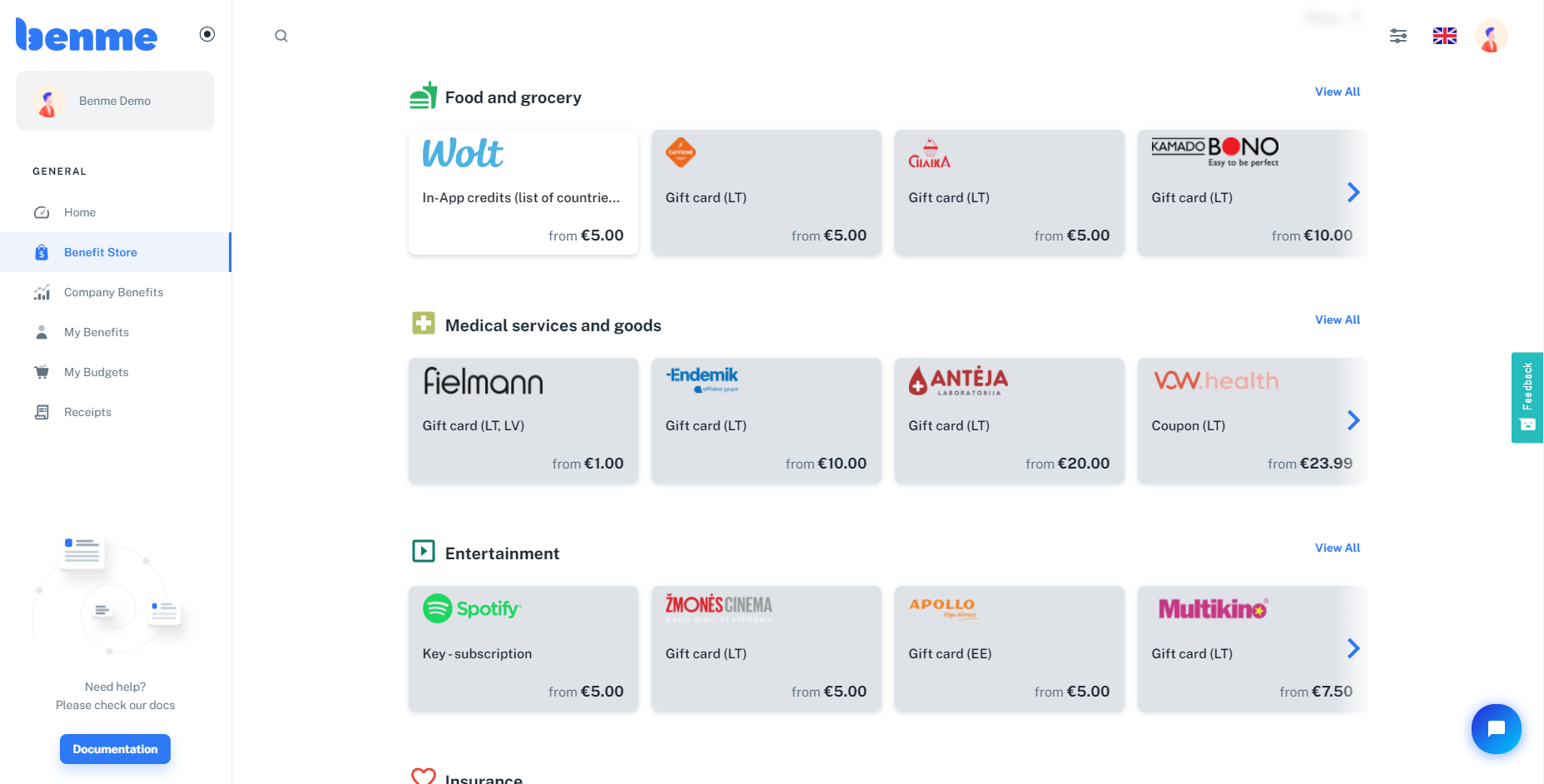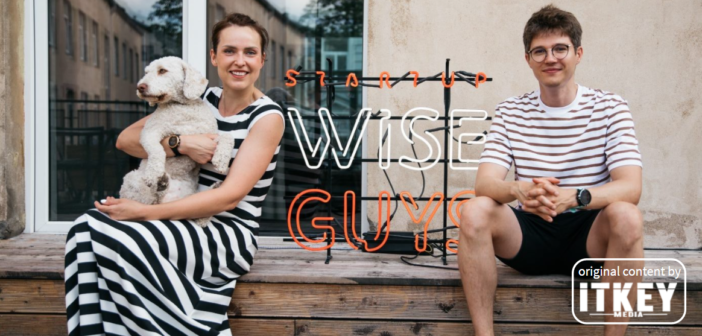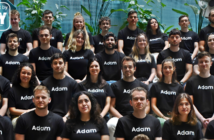Founded in the dawn of the pandemic, Lithuanian employee benefits startup benme has raised over 150,000 EUR in funding, secured more than 40 clients from 18 countries and is planning to further grow its team after recently doubling it.
“Currently, we have clients from Australia, the UK, Brazil, Canada, and all over the Europe (…) more than 40 from all over the world; to be exact, we have covered 18 countries and expanded our geographical presence rapidly”, Irma Bučinskaitė, CEO and co-founder of benme, told ITKeyMedia.
She explains that, initially, attracting investors was not an easy task, as people assumed they were just like any other benefits platform on the market. “Only after some time in the TechHub support programme (accelerator programme implemented by MITA, the Lithuanian government’s Agency for Science, Innovation and Technology – editor’s note), did we succeed in finding the right words to explain why benme is a revolutionary platform. And as soon as you have a useful product and know how to communicate its value to the investors, the process of attracting funding becomes much easier”, she recalled.
In February 2022, benme raised 100,000 EUR from two private business angels, whose identity has not been revealed. The startup received 50,000 EUR from Estonian fund Startup Wise Guys, in August 2021. Bučinskaitė mentioned she does not rule out the possibility of cooperating with new investors in the future, but refused to provide more information.
Since the beginning of 2022, benme has hired 5 new employees, which is exactly how much the company had when it gained its first client. “And we await more members to join shortly”, said Bučinskaitė, highlighting that she is specifically looking forward to recruiting a sales specialist.
Bridging the Gap between Employer, Employee and Benefits Provider
benme operates an online platform for managing and procuring employee benefits, allowing teams and employees to create individual packages, combining for example health insurance, wellness, food, travel services, goods, etc.
What makes them different from other providers? According to Startup Wise Guys partner Dmitrij Sosunov, benme is one of the software solutions which goes beyond the administration of benefits currently available in a specific company and connects employees and benefits providers “with no geographical nor variety limits”, he told ITKeyMedia.
While people more and more often choose to work remotely, their needs are becoming wider and more different, and the customisation of benefits works perfectly as a solution here – and when it comes to benme, it is about tailor-made benefits for every employee, Sosunov added.
I see Benme working with the largest accounts in the Baltics and beyond, serving thousands of employees, so each employee can choose and enjoy the benefits they need.
— Dmitrij Sosunov, partner at Startup Wise Guys
Designed with both employees and HR people in mind, benme allows companies to save resources and meet its employees’ expectations by paying for only what they want, complemented Bučinskaitė. She added that alternative platforms can either provide a tool for benefits administration and communication with employees (but it does not eliminate struggles related to suppliers’ search, selection, benefits management, and administration of invoices), or either suggest a marketplace with limited suppliers, benefits selection or limited to a particular region. “benme provides both.”

Screenshot of benme’s platform
Because it is a SaaS platform (software-as-a-service), pricing starts from 1 euro per seat per month, however benme’s representatives did not wish to provide further details, stating that packages are calculated individually according to the client’s needs and employee count.
The platform currently has over 125 suppliers and users can also suggest their own suppliers. “Thus, the number of suppliers will be defined by platform users and the demand for a benefit”, explained Bučinskaitė.
Best Sellers
The “best-sellers” are benefits of food suppliers, and the least popular are medical services, which Bučinskaitė attributes to the age-old problem of people not prioritising their health while there is no acute need for it. “However, it is also possible that the lower popularity of these services may have also been affected by the COVID-19 pandemic and the difficulty in accessing medical services”, she added.
On the other hand, Sosunov says that, in the context of the war in Ukraine, one of the most well-regarded features of benme is the use of benefit packages for donations and mental health support. As for the ‘worst’ benefits, he explains that there really is no such category when speaking about employees’ needs, but they could be those chosen by employers without consulting employees beforehand.
The current status of benefits and reward policies in many organisations is not satisfactory, explains Sosunov, citing “many” employees’ surveys. Bučinskaitė confirmed, emphasising that 45% of employers face difficulties in developing motivation packages and that only 40% of employees are satisfied with what they receive.
Collecting information, finding the right supplier(s), negotiating terms and prices, communicating the benefist – all this takes just huge amounts of time and resources to manage and lasts much longer than it has to. And after all the hard work, there is no guarantee that employees will be satisfied.
— Irma Bučinskaitė, CEO and co-founder of benme
“It is clear they are not happy, as employees understand – or can imagine – the value of the benefits. Consequently, they may consider many alternatives they would rather spend the same amount of money on. What is applied to everyone usually does not work for anyone”, she underlined.
From Gyms and Finances to HR
benme was founded in January 2021 by CEO Irma Bučinskaitė, and CTO Tomas Smagurauskas, who has over 10 years of experience in the software development and engineering field. He is also a lecturer at Vilnius University.
Bučinskaitė, who has managed two health clubs/ gyms and worked as an independent financial advisor, has been in the employee benefits sector for more than 15 years, working in companies like Baltic Salary Survey and Marsh & McLennan.
 “ben” is the shortened form of “benefits” and “me” comes from the everyday “you and me“ expression. The stylised “b” represents a “thumbs up“ (👍)
“ben” is the shortened form of “benefits” and “me” comes from the everyday “you and me“ expression. The stylised “b” represents a “thumbs up“ (👍)

Sabin Popescu works as content editor, web designer/ developer and occasionally graphic designer for various companies and institutions across Eastern Europe and was an IT journalist for Romania’s leading business daily, Ziarul Financiar.







